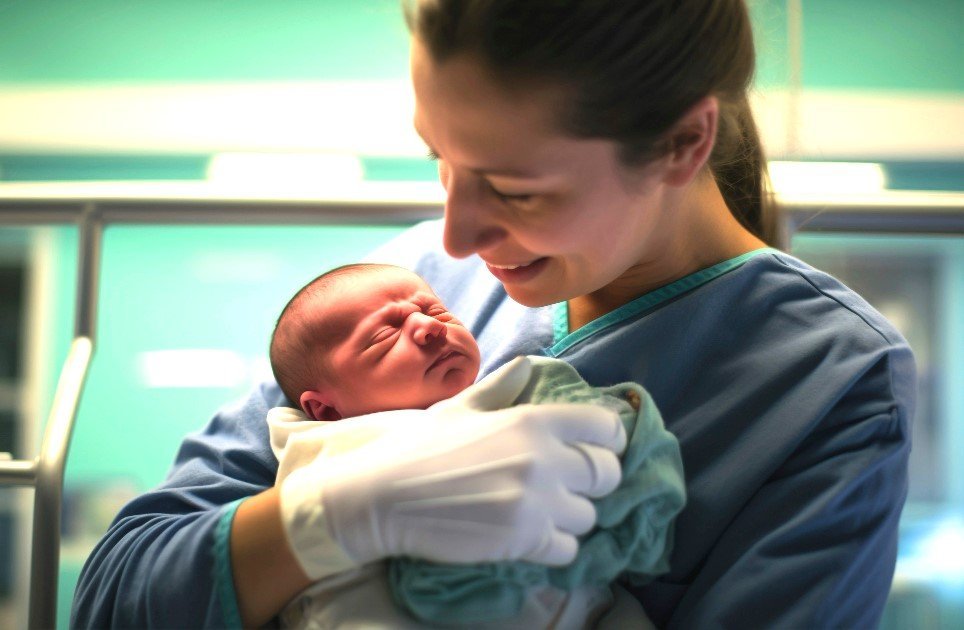Let’s closely examine why you should identify your support network and what constitutes good postpartum health. Additionally, we’ll look at the red flags to watch out for when seeking help, so that you and your family receive the exact type of excellent care you need.
Postpartum Caregivers Every New Mom Should Know About
As new moms (and other non-birthing parents) adjust to life with a newborn, they must understand who can support them, their babies, and family in that important phase. Knowing who to turn to for help is a big deal, particularly because the real postpartum period is longer than just the six to eight weeks following childbirth. Medicine.net, suggests it takes six months to a year, and even longer for certain women!
Why Should You Bother Identifying a Support Network?
After the six-week checkup with an OB/GYN, many parents may wonder where to turn for continued care. Fortunately, some healthcare professionals and service providers are dedicated to supporting postpartum mothers and families.
It’s comforting to realize that you’re not alone. Postpartum support may come from OB/GYNs, midwives, doulas, general practitioners, mental health specialists, and even family members. The key is understanding who to contact based on your specific needs. The support network helps to address immediate health concerns and provides ongoing care for physical, mental, and social well-being.
What is Good Postpartum Health
According to the World Health Organization (WHO), health is defined as a state of complete physical, mental, and social well-being—not merely the absence of illness. For new mothers, the definition takes on added importance.
Physical well-being means recovering from childbirth, whether through vaginal delivery or C-section. Mothers should also recover from any complications that may have arisen during labor and delivery.
Mental well-being includes addressing postpartum mood changes, such as the “baby blues,” postpartum depression, or anxiety. Appropriate support and treatment should be available to manage the conditions.
Social well-being encompasses having a network of family, friends, and community resources to rely on. That support helps mothers manage the challenges of postpartum life, so they’re not isolated or overwhelmed.
Achieving complete well-being in all areas takes time in many cases. That’s why the postpartum period often extends beyond six weeks—sometimes up to a year or more. Postpartum health is about immediate recovery; as well as long-term support for the mother and her family.
A Postpartum Experience For Your Family

It’s important to remember that the postpartum period affects the entire family. While family members may not have undergone the physical challenges of childbirth, their mental and social well-being also needs attention. Partners and other family members must adjust to the changes that come with having a newborn. They too require support to go through that period successfully.
Many healthcare providers use the bio-psycho-social model when working with postpartum families. The holistic approach takes into account biological, psychological, and social factors, helping healthcare professionals address the full spectrum of health needs.
Who Supports You During the Postpartum Period?
Postpartum care begins in the delivery room and extends far beyond the hospital. The following timeline outlines the key professionals who will be part of your care team, from labor through the months (or even years) following childbirth.
Labor and Delivery
Midwives often take the lead during labor, guiding mothers through the birthing process. In many Western countries, some mothers also work with a labor doula, who provides emotional and physical support during childbirth.
In areas where midwives may be scarce, such as rural Australia, general practitioners trained in obstetrics may lead the delivery.
OB/GYNs typically step in when complications arise. The specialists offer both medical and surgical care, including emergency C-sections when necessary. While midwives lead most uncomplicated births, OB/GYNs step in when more intensive interventions are required.
Postpartum Care: First Six Weeks
In many parts of the world, midwives continue to provide postpartum care through home visits. They check on both the mother’s recovery and the newborn’s health, complementing the baby’s pediatric care. In cases where midwives are unavailable, community nurses and maternity nurses take on that responsibility.
Some families choose to hire postpartum doulas, overnight nannies, or newborn care specialists to provide additional support. In East Asian countries, Confinement nannies help new mothers during the first 30 days, allowing them to rest and recover.
After Six Weeks

After the six-week OB/GYN checkup, it’s time to establish care with a primary care provider, who could be a general practitioner, family medicine doctor, nurse practitioner, or physician assistant. They are healthcare professionals who monitor your physical health offer mental health support and refer you to other specialists when needed.
For mental health support, you may also reach out to counselors, therapists, psychologists, or psychiatrists. In some communities, chaplains and family life counselors provide nonmedical counseling.
Complementary Therapies
In addition to conventional medical care, many families explore complementary therapies during the postpartum period. For example, conventional Chinese medicine and Ayurveda may play a role in postpartum wellness, particularly for families with cultural ties to such practices.
In the West, functional medicine and holistic health practitioners offer complementary approaches to health and well-being. Working with practitioners alongside your primary care provider gives you access to a well-rounded care plan.
Physical Rehabilitation
Postpartum physical recovery isn’t just about getting back into shape—it’s about regaining strength and function. Engaging with a physical therapist or personal trainer who specializes in pelvic floor rehabilitation may be necessary for long-term recovery. The listed professionals help restore strength to pelvic, abdominal, and core muscles, especially after a C-section or complicated vaginal delivery.
Red Flags When Seeking Postpartum Care
Not all providers will have your best interests at heart. You must be aware of red flags when seeking care during the postpartum period.
Watch out for practitioners or services that:
- Fail to listen to your concerns or dismiss them.
- Offer one-size-fits-all solutions without considering your specific needs.
- Don’t work collaboratively with other members of your care team.
- Pressure you into treatments or services that don’t feel right.
Partner with Dr. Kristal Lau for Postpartum Wellness
Dr. Kristal Lau, a renowned postpartum wellness coach, MD, and mother of two, offers expert guidance for modern mothers. With 13+ years of experience in healthcare and a unique blend of clinical and conventional Chinese medicine, she tailors health plans to meet the specific needs of her clients.

Her “Quality of Life” approach focuses on helping mothers and their families live well, beyond managing illness. If you’re ready for personalized support, book your free call with Dr. Kristal Lau today!
If you’d also love to hear Dr. Lau speak in detail about getting the right postpartum help, check out her podcast, The PostPartum Wellness Show — which is also available for free in video format.
FAQ Section
What is the best time to start working with a postpartum wellness coach?
It’s recommended to start working with a postpartum wellness coach as soon as possible after childbirth. However, you may seek support at any stage of your postpartum period to get help for recovery, mental health, and long-term wellness.
Can a postpartum wellness coach help with mental health challenges like postpartum depression?
Yes, a postpartum wellness coach could provide guidance and support for mental health challenges like postpartum depression. While they don’t replace a licensed therapist, they work alongside medical professionals to offer holistic support.
Will I still benefit from postpartum wellness coaching if it’s been a few months since childbirth?
Absolutely. Whether it’s been weeks, months, or even years since childbirth, postpartum wellness coaching does help address long-term recovery, lifestyle adjustments, and overall wellness.
